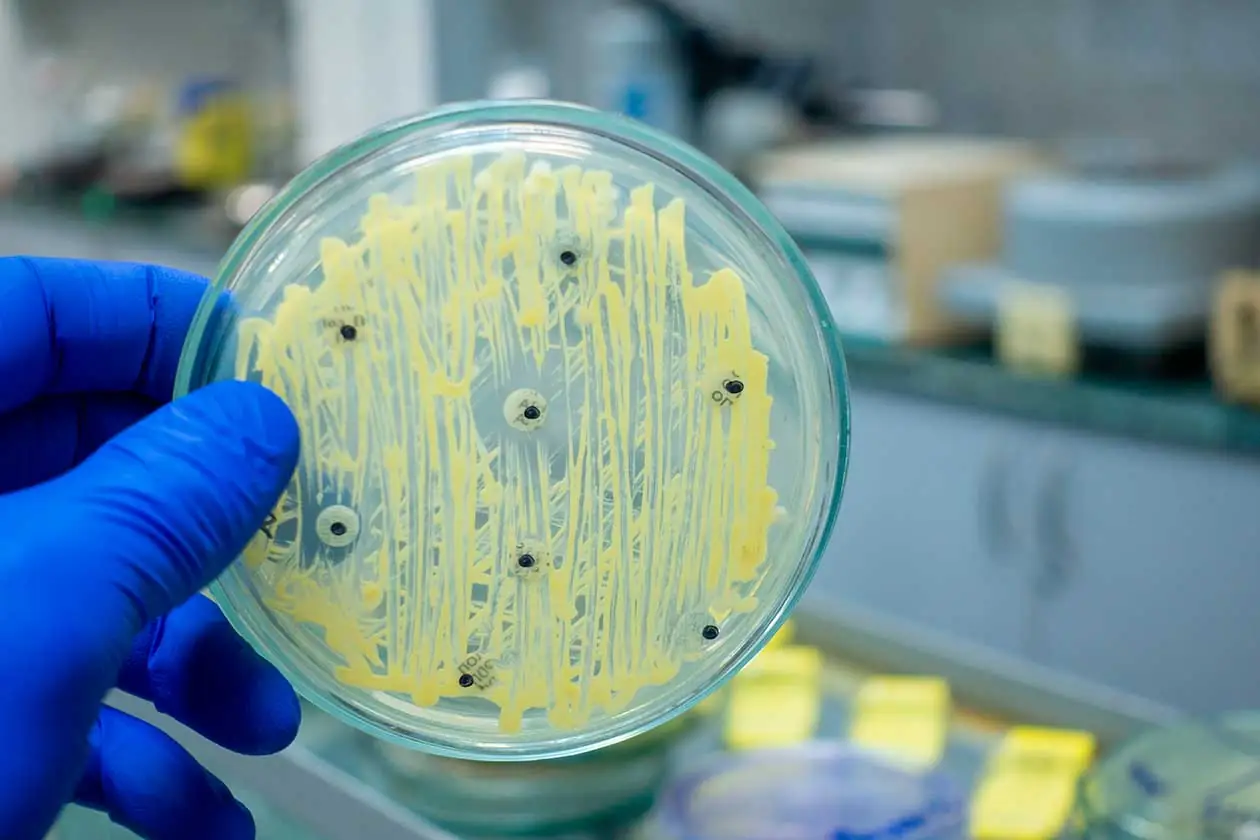The challenges posed by antimicrobial resistance are complex and multifaceted, but they are not insurmountable. During World Antimicrobial Awareness Week, we share some of the initiatives we are working on, with various entities and companies, to curb antimicrobial resistance (AMR) in sectors such as food and healthcare, among others.
World Antimicrobial Awareness Week (18th to 24th November) is a global campaign organized by the Food and Agriculture Organization of the United Nations (FAO), the United Nations Environment Programme (UNEP), the World Health Organization (WHO), and the World Organisation for Animal Health (OIE), to promote awareness and understanding of antimicrobial resistance and encourage best practices among stakeholders in One Health, in order to reduce the emergence and spread of antimicrobial-resistant pathogens.
Antimicrobials are substances used to prevent, control, and treat infectious diseases in humans, animals, and plants, but they are becoming increasingly ineffective. The misuse and overuse of antimicrobials in humans, animals, and plants are accelerating the development and spread of antimicrobial resistance worldwide. Currently, AMR represents one of the greatest threats to global health, food security, and development.
Antimicrobial resistance (AMR) occurs when bacteria, viruses, fungi, and parasites stop responding to antimicrobials. As a result of drug resistance, antibiotics and other antimicrobials become ineffective, and infections become difficult or impossible to treat, increasing the risk of disease spread, severe forms of illness, and death.
Preventive measures to curb antimicrobial resistance
To effectively curb antimicrobial resistance, all sectors must join forces to promote prudent use of antimicrobials, as well as preventive measures. Strengthening infection prevention and control in healthcare facilities, agricultural farms, and food industry facilities, ensuring access to vaccines, clean water, sanitation, and hygiene, implementing best practices in food and agricultural production, and ensuring proper waste management and wastewater treatment from relevant industries are essential to reduce the need for antimicrobials and minimize the emergence and transmission of antimicrobial resistance.
MICOALGA-FEED, MICROBIOSAFE, and BIOCLEAN are initiatives to curb antimicrobial resistance (AMR)
At AINIA, we are working on various initiatives to curb antimicrobial resistance (AMR) in sectors such as food and clinical, among others:
1. Development of new active ingredients with antimicrobial activity against foodborne pathogens
At AINIA, we are working on the MICROBIOSAFE project, where we research and experimentally develop new active ingredients with antimicrobial activity against pathogens that appear in the food production chain (spanish) and whose origin is associated with production animals (zoonotic pathogens).
Multisectoral use: food preservation, animal feed, and cleaning products
The application of these compounds is multisectoral as they are intended to be incorporated into food as preservation systems, as additives in animal feed to reduce the use of antibiotics in animal production systems, and to be used in industrial cleaning products to eliminate their presence throughout the food processing chain. The antimicrobial strategies we have developed within the project consist of:
- Bacteriocins produced by lactic acid bacteria
- Bacteriophages and their endolysins
- Antimicrobial peptides from protein matrices, obtained through biocatalysis
We’ll tell you about the main advances in this field through this video (spanish)
2. Comprehensive biotechnological system for microbiological cleaning and disinfection of pathogens in food and clinical settings
In the BIOCLEAN project, we are researching and developing a comprehensive biotechnological system for cleaning and microbiological disinfection of pathogens (spanish) with applications in both food safety and clinical sectors. This system is based on:
- Biotechnologically-based cleaning and disinfection products: Developing a range of biotechnologically-based cleaning and disinfection products based on effective endolysins against various pathogens, applicable to both the food safety sector and clinical settings (corrective module).
- Biosensor system to predict and identify the origin of contamination “in situ”: A biosensor system based on metagenomic techniques combined to predict and identify the origin of specific contamination “in situ” (predictive module). Since enzymes (endolysins) are specific to the pathogenic bacteria to be eliminated, an additional system is needed to predict and identify the origin of specific contamination “in situ”. Once the pathogen is identified with the biosensor, biotechnological cleaning products with active enzymes against these pathogens are applied.
This project is led by the company Cleanity. In addition to AINIA, the company Lumensia and three research centers: FISABIO, IATA-CSIC, and iCMOL-UV are participating.
3. Reduction or elimination of antibiotics in livestock through natural feeding based on the use of fungi and microalgae
We are also part of the supra-regional Operational Group MICOALGA-FEED, where we work to reduce or eliminate antibiotics in livestock through natural feeding based on the use of fungi and microalgae. This group is founded on the One Health initiative of the WHO, which involves the collaboration of multiple disciplines at the local, national, and international levels to achieve optimal health for people, animals, and the environment.
In this regard, MICOALGA-FEED focuses on improving animal welfare in poultry farming. When an animal is sick, it is treated with antimicrobials. However, alternative measures to their use have been researched for years. In the case of poultry farming, the most frequent routes of transmission are digestive and inhalation, due to the breakdown of the intestinal barrier, which facilitates the colonization of pathogenic microorganisms causing diseases that require treatment.
- The valorization of by-products from the industrial processing of fungi and microalgae for the production of functional ingredients.
- The design, characterization, and validation of feed formulated from ingredients with antimicrobial and immunomodulatory capacity.
The operational group, which covers the regions of Galicia, Asturias, and Navarra, is coordinated by the Galician Business-University Foundation (FEUGA), and also includes Hifas Veterinary S.L., NeoAlgae Micro Seaweed Products S.L.N.E., and Grupo UVESA as partners. At AINIA, we actively collaborate in this project by studying the antimicrobial capacity against zoonotic pathogens, as well as the immunostimulant capacity of fungal and microalgae extracts before and after their incorporation into animal feed.
The partners of the MICOALGA-FEED Operational Group tell us about their participation in this video (spanish).




